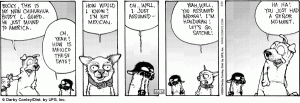The last time I called my mother, she complimented me on the quality of the blog and, specifically, on my post “From the Motherland.” She may have had a bias toward the subject matter of that particular piece, it’s true, but I still appreciated the praise.
In any case, she added that it was good for me to post regularly because of the cathartic effect of writing. She said, “You know we Hispanics don’t believe in therapy. We believe in poetry.”
I thought she made an astute point (although I myself have no interest in poetry and couldn’t tell you the difference between a sonnet and a salamander).
Her main argument, of course, is that Latinos have traditionally embraced art and creativity when confronting personal issues rather than calling upon psychology or therapy. I believe that she’s right, but I don’t know the cultural or sociological reasons for this.
Given the choice between expressing our turmoil with epic novels or dropping on a couch to discuss how our fathers never loved us, we will start scribbling away. If we can get it all out with some angry song or wild dance, we will skip hyperanalyzing the Freudian reasons that we forgot our spouse’s birthday. And we would much rather create a deranged painting or warped sculpture than pay $150 an hour to hear a bald man ask, “How did it make you feel to be picked last for the kickball team?”
Think about it. What is the likelihood of ever seeing a Woody Allen movie in which a Latino kvetches to his psychologist?
I don’t know of any Hispanics who have benefited from therapy. Maybe it’s class thing, because many Hispanics are frankly too broke to splurge on something as trivial as their mental health. Or maybe Latino culture prioritizes self-expression over introspection. Or perhaps we just have a surplus of writers and artists with a backlog of violent revolutions and colorful family members to supply acres of good material.
I can’t explain it, but I admit that I’m much more likely to write it all down than seek out a trained therapist. I’m not saying that it’s a superior method. Indeed, perhaps I could benefit from a head-shrinking.
But now I’m getting all angsty. Maybe I should talk to somebody about that.





